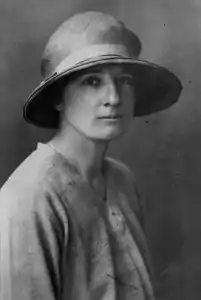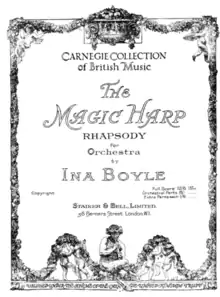Ina Boyle
Ina Boyle (8 March 1889 – 10 March 1967) was an Irish composer: the most prolific and significant female composer from Ireland before 1950.[1] Her compositions encompass a broad spectrum of genres and include choral, chamber and orchestral works as well as opera, ballet and vocal music. While a number of her works, namely, The Magic Harp (1919), Colin Clout (1921), Gaelic Hymns (1923–24), Glencree (1924-27) and Wildgeese (1942), received acknowledgement and repeated performances during her lifetime, the majority of her compositions remain unpublished and unperformed.[2]

Biography

Boyle was born in Bushey Park near Enniskerry, County Wicklow, and grew up in a restricted circle of her mother, father and sister. Her first music lessons were with her father William Foster Boyle (1860–1951), who was curate at St. Patrick’s Church, Powerscourt and was given violin and cello lessons by her governess with her younger sister Phyllis. From the age of eleven, she studied theory and harmony with Samuel Myerscough, the English organist who founded the Leinster School of Music in 1904.[3] From 1904 onwards, she also undertook lessons via correspondence with Charles Wood, who was married to Boyle's cousin Charlotte Georgina Wills-Sandford. In 1910, Boyle began to take lessons with Percy Buck who had just been appointed a non-resident professor of music at Trinity College Dublin. By 1913, Boyle began studying counterpoint, harmony and composition with Charles Herbert Kitson and George Hewson in Dublin.[4] Kitson encouraged her to compose the two anthems published in 1915, but his promise of a performance at Christ Church did not happen in the end.[3] From 1923, Boyle began to travel to London to take lessons with Ralph Vaughan Williams. After exchanging correspondence, Boyle took her first composition lesson with Vaughan Williams at his home in February 1923.[5]
Because of her isolation, Boyle's music was seldom performed. However, she continued to compose until her death.[6] Early recognition came in 1913 when two of her works, the Elegy for cello and orchestra and a setting of Walt Whitman's The Last Invocation, were awarded first and second prizes in the composers' competition at the Sligo Feis Ceoil.[3] In 1919, her orchestral rhapsody The Magic Harp received a Carnegie Award and was taken up by the conductor Dan Godfrey in Bournemouth.[7][8] The first of her three symphonies was composed between 1924 and 1927, but had to wait until 1945 for its first complete performance, at a Raidió Éireann studio concert.[9] Subtitled Glencree ("In the Wicklow Hills"), the three movements take the form of tone poems describing specific locations: "On Lacken Hill", "Nightwinds in the Valley", and "Above Lough Bray".[10] The brief, three-movement Violin Concerto of the early 1930s has (according to Rob Barnett) "more in common with The Lark Ascending than with the big British Isles statements by (Bax, Walton, Dyson, Creith and Moeran) of that decade".[11] The Concerto was dedicated to Boyle's mother who had died in 1932. Lament for Bion, a Greek-themed composition for tenor and strings she submitted to the Olympic Cultural Activities Committee, won an Olympic Honourable Mention in 1948 for Ireland.[12][13]
Ina Boyle died of cancer in Greystones, County Wicklow,[14] and her papers are archived in the Library of Trinity College, Dublin.[15] Trinity College has digitised most of her music manuscripts, and they can be searched and studied online. A feature-length documentary about the life and music of Ina Boyle titled From the Darkness was broadcast 12 June 2010 on Ireland's RTÉ Lyric FM. In April and May 2013, an exhibition at Trinity College highlighted "Ina Boyle’s Symphonic Journey". A CD of some of her major orchestral works, including the first full recording of her Symphony No. 1, was issued by Dutton in 2018.[11]
Selected works
|
Opera
Choral music
Orchestra
|
Solo voice with orchestra
Songs (for voice and piano, if not otherwise mentioned)
Ballet scores
Chamber music
|
Recordings
- The Magic Harp, performed by Bournemouth Symphony Orchestra, Ronald Corp (cond.), on: Dutton Epoch CDLX 7276 (CD, 2011).
- The Wild Geese, performed by European Union Youth Orchestra, Laurent Pillot (cond.), on: Classical Recording Company CRC 2309 (CD, 2013).
- Sleep Song and Three Songs by Walter de la Mare, performed by Aylish Kerrigan (mezzo) and Dearbhla Collins (piano), on: Métier MSV 28558 (CD, 2016).[16]
- Elegy, performed by Nadège Rochat (cello), Staatskapelle Weimar, Paul Meyer (cond.), on: Ars Produktion ARS 38 221 (CD, 2017).
- Orchestral works: Overture; Violin Concerto; Symphony No. 1 Glencree; Wildgeese; Psalm; A Sea Poem; Colin Clout, performed by BBC Concert Orchestra, Benjamin Baker (violin), Nadège Rochat (cello), Ronald Corp (cond.), on: Dutton Epoch CDLX 7352 (CD, 2018).
Bibliography
- Elizabeth Maconchy: Ina Boyle. An Appreciation with a Select List of Her Music (Dublin: Dolmen Press, 1974).
- Sheila Powerscourt: "Powerscourt and Ina Boyle", in: S. Powerscourt: Sun too Fast (London: Bles, 1974), pp. 201–15.
- Axel Klein: Die Musik Irlands im 20. Jahrhundert (Hildesheim: Georg Olms Verlag, 1996), pp. 174–6, 368–71.
- Sonya Keogh: Ina Boyle. A Life and Work (MPhil, University College Cork, 2002).
- David Scott: Examining the Irish Art Song: Original Song Settings of Irish Texts by Irish Composers, 1900–1930 (MPhil, DIT, 2018).
- Ita Beausang, Séamas de Barra: Ina Boyle (1889–1967). A Composer's Life (Cork: Cork University Press, 2018); ISBN 9781782052647.
References
- Sadie, Julie Anne; Samuel, Rhian (1994). The Norton/Grove dictionary of women composers (Digitized online by GoogleBooks)
|format=requires|url=(help). - Contemporary Music Centre, Ireland
- Beausang, Ita: "An Irish composer and World War I", from Enniskerry Local History Archives.
- Scott, David (2018). Examining the Irish Art Song: Original Song Settings of Irish Texts by Irish Composers, 1900-1930 (MPhil). DIT. pp. 109–110.
- Vaughan Williams, Ralph; Cobbe, Hugh (2008). Letters of Ralph Vaughan Williams 1895-1958.
- Fuller, Sophie (1994). The Pandora Guide to Women Composers: Britain and the United States.
- Dan Godfrey Encores, MusicWeb International
- Score of The Magic Harp, Stainer & Bell.
- RTE, Composing the Island (2016) programme notes.
- Foreman, Lewis. New Dutton Epoch releases – April 2018
- Boyle: Orchestral Works. MusicWeb International.
- Beausang, Ita: An Irish Composer and the 1948 Olympics.
- "Ina Boyle". Olympedia. Retrieved 21 August 2020..
- Ita Beausang: "Boyle, Ina", in: The Encyclopaedia of Music in Ireland, ed. by Harry White and Barra Boydell (Dublin: UCD Press, 2013), p. 119–121.
- "INA BOYLE (1889-1967)". Archived from the original on 20 October 2006. Retrieved 1 February 2011..
- France, John. "I am Wind and Sea (review)". MusicWeb International. Retrieved 29 November 2020.
